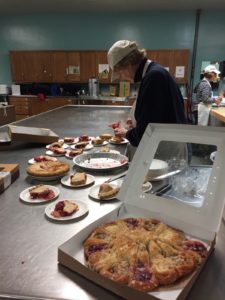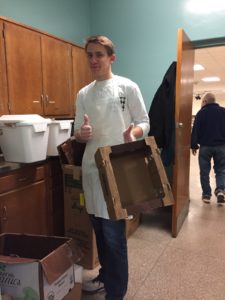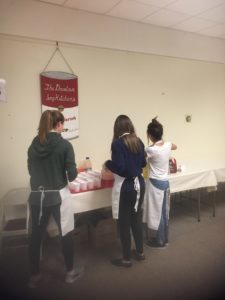


Date of Immersion: 2/17/17 and 3/3/17
Location: United Methodist Church
Type: Immersion Experience
Event: Soup Kitchen
Event Description: This church in South Bend serves as a soup kitchen on Mondays, Wednesdays, and Fridays. It serves people in need, whether they are homeless or not. Food is prepped on location in the kitchen, and donations are taken from local establishments such as Martin’s Supermarket and Panera Bread. From 12:00 to 12:45 pm, soup, drinks, and other foods are distributed to individuals. Additionally, individuals are allowed to take food from a small food pantry on the side of the room and may also take soup to take away.
Key Takeaways:
Role of Nutrition
There are an abundance of resources to provide food for the homeless population in South Bend. There are several soup kitchens like this one, as well as food banks. Both people who are homeless and who are not go to the soup kitchen to get food. Since they cannot afford nutritious meals, the food banks are the best way to eat more healthily. If they do not go to the soup kitchen, they are likely to eat at fast food restaurants. We noticed that many of the individuals would go back for seconds and thirds, as well as take food from the food bank and take a to-go bag of chili for later in the day. It is important for the soup kitchens to provide these people with meals that will keep the homeless population full for more than just that day.
Lack of Woman in Relation to Men
From our observations, many of the individuals who show up to eat at the soup kitchen were male. Although there were a few women and one family that came both times, they were in the minority. We were unsure if there were less women because they feel unsafe or uncomfortable, but there is a good chance that there are less homeless women in South Bend because of the danger posed against them. Additionally, they may use this resource less often than men because we found some of the men were taking food back to their wives—wherever they might be staying.
Time of the Month
Our first immersion occurred in the middle of February, which was much busier than when we visited again in the first week of March. After asking pastor Robert Powell as well as some of the regular volunteers, Marty and Paul, we found that visitation of the soup kitchen fluctuates depending on the time of the month. The beginning of each month, individuals receive paychecks, either welfare, disability, or from their jobs; therefore, they have more money to spend on food and other resources. Meanwhile, more people come during the middle of the month because they have either used up their checks or their funds have reached too low to pay for food.